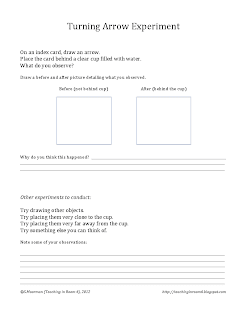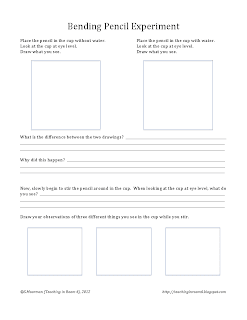Each year, my school holds NASA Night, where one scientific strand is highlighted. This year, our theme was "Light", with my particular topic being Light Refraction (sounds fancy, huh??). During this night, parents and students wander the school, from room to room, conducting easy, independent experiments and activities all designed to get them involved in scientific exploration.
While I realize that your school probably is not holding a NASA Night, these 4 activities I am going to tell you about can be done in your own classroom in about an hours time. If you set it up correctly, the students will be engaged and learning, working through the scientific process, and doing hands-on science, without a lot of intervention from you!
The Set Up
You can see that I have four stations set up. Each was color coded and had 4 different areas for the experiments. This helped to keep everything in order and to make sure that the students were on track. (the recording sheets, which you can see in the corner) were also color coded for easy of access. Of course, you don't have to rearrange your room like this (since you don't have hundreds of families coming through your room) but it did make it very easy for everyone to get to the experiments.
The Experiments
There were four experiments in total (with me doing the amazing "Disappearing Glass Trick" on the side). At each station, I had all of the materials needed as well as a scientific rationale for why each experiment worked. The recording sheets were fairly self-explanatory, so I really didn't have to do much in the way of helping out. If I did this solely with my class (since there *were* parents there), I would have explained them a bit more, but not much. Letting the kids explore the concepts is a great part of the learning here!
On each station, I had the rationale and scientific reasoning for WHY the experiment worked. So after each child filled out the recording sheet and put down their own thoughts, they then read the rationale to get a more scientific explanation.
Turning Arrow -- in this experiment, students draw an arrow on an index card. The, placing the index card behind the clear plastic cup, the arrow seems to turn around!


Rising Coin -- placing a penny at the bottom of a bowl (use a little sticky tape to keep it in place), then backing away, it appears that the coin disappears. If you then have a partner pour water into the bowl, the coin 'magically' seems to rise up so you can see it...however the coin never moves!

Magnification -- objects can be magnified because of the special properties of light and shape. This experiment helps the kids see how water and glass can magnify things.

Bending Light -- sticking a straight pencil into a clear plastic glass of water, the kids are able to see how the light moves through water and appears to "bend" the pencil.

Since many of these experiments use water, I would recommend having some of them (especially the rising coin) inside of a big tub. It will help to keep the water from going all over the place. The magnification one also doesn't need a ton of water, so you might want to just have a VERY small cup of water there.
So there you have it. I hope these give you some inspiration to conduct some simple experiments in your class. I know how intimidating science can be (trust me....it is intimidating for me!) but doing simple little things in your class can get the kids excited and actively engaged in this subject.







Neat activities!! Thanks for sharing!
ReplyDeleteThanks, these are great. We did this topic and science fair a little earlier this year. I am going to do this next year. I agree with you on how much the students love to do hands-on science. My class loves even the simplest of experiments and demonstrations. Thanks so much for sharing.
ReplyDeleteLove this! I plan on doing a lot of fun, hands-on science after state testing as well as holding a classroom science fair. This is perfect! Thanks for sharing!
ReplyDeleteThanks everyone! My parents and students of all ages really loved them....though I do have to say, there was water all over. So make sure you have some big buckets to put the stuff in.
ReplyDeleteGreat Blog! I am your newest follower!
ReplyDeleteAdrienne
Unless Teaching
Very awesome! I just did the bending pencil activity in my class last week, and may plan some of these other activities soon. Thanks much for the inspiration!
ReplyDeleteWe have an annual science fair at our school. I love the idea of setting up stations like this to get the students thinking and asking questions.
ReplyDeleteArtistry of Education
I loved this post! I am teaching a unit on light next term and these activities will be perfect. I am wondering if it's at all possible please to download the rationales as well? I would be happy to buy them through TPT.
ReplyDeleteThanks for such a great site. All of your posts inspire me to be more rigorous in my teaching!
Never mind - just found it at the end of the Google Docs. I'm like those kids who never read all the instructions before starting an activity ;)
ReplyDeleteThanks for sharing this resource with us!
I love this site! Thank you for sharing your great ideas and resources! I'm student teaching and looking for hands on labs for my sixth grade. I liked the idea of the broken pencil because it incorporated density by using the saltwater, however when I try it at home I can't seem to get it to work. I've created a solution of 1/2 cup of salt to about 1 cup of water... it was pretty saturated... any ideas of what I'm doing wrong? I can see the density line, but it doesn't translate to 'break' the pencil.
ReplyDeleteThanks so much for sharing!
ReplyDeleteBrilliantly executed.
ReplyDeleteThank you! I am always looking for more ways to teach refraction. Can't wait to try it!
ReplyDeleteBrilliant- these will help my Grade 5s understand more about refraction (they certainly helped me!!)
ReplyDeleteCan you explain the magnification experiment more?
ReplyDeleteThis is AWESOME, Stephanie! We are doing light right now. I've got to get my butt in gear and do this with them. Thanks for the great post! FlapJack
ReplyDeleteFun Life Time is talking about Educational Websites For Kids. This site, Fun 4 The Brain is full of science Reading And Math Games For Kids. We are talking about the freely and rest life and freshness for your lovely kids. We serve fun life time, Fun 4 The Brain, Educational Websites For Kids and we also provide games for kids here are avail kizi online games life is fun, Math Games For Kids, Activities To Do With Kids, and Brain Games For Kids. We teach science activities here are Brain Games For Kids, Science Activities. Games are availing Kizi Games, Science Activities For Preschoolers and fun 4 the brain. The Brain is a website of Brain Math of English, math and science. Plaster time is a great website for children, young people, parents and students that’s give you cute and best Quotes about Having enjoying.
ReplyDeleteThank you so much for your help with these experiments. You are truly an amazing teacher. Thank you for the worksheets and the answers.
ReplyDeleteFantastic site. Thank you so much for sharing your ideas. I'm looking forward to teaching this unit now!!
ReplyDeleteGreat ideas and awesome resources. I have always struggled with getting students to record their observations. I think these will work great! Thank you for sharing!
ReplyDelete